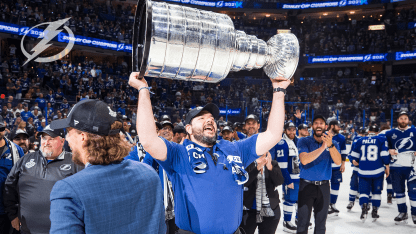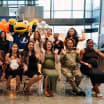Positive energy, hard work, whole-hearted support and brutal dad jokes.
If you ask some of the NHL players who have been helped by Tom Mulligan, that’s what the longtime head athletic trainer for the Tampa Bay Lightning brings to work every day.
Mulligan will work his 2,000th game in professional hockey on Tuesday when the Lightning host the Columbus Blue Jackets at 7 p.m. Mulligan is in his 23rd season with Tampa Bay.
Former Lightning captain Steven Stamkos worked with Mulligan for the first 16 seasons of his NHL career. Stamkos said Mulligan helped him through his toughest days.
“He’s always been there for me when I needed him the most,” Stamkos said. “He’s one of the nicest guys around, and he just has this way of really calming you down in some tough situations as an athlete when you’re feeling the lowest. Any time you sustain an injury it feels like the end of the world, and he finds a way to get you to a place where you know it’s going to be OK.”
Mulligan, dubbed ‘Mully’ by many members of the organization, grew up playing hockey before deciding to pursue athletic training because the career path combined two of his greatest interests in sports and medicine.
After a college career at Quinnipiac University, Mulligan began working with the Boston Bruins organization as an intern, joining the club’s AHL team in Providence in 1998. Mulligan, who grew up a Bruins fan, spent four years with the franchise before joining Tampa Bay in the summer of 2002.
“Jay Feaster and John Tortorella gave me the opportunity, and as each successive ownership, new management and coaching change that’s happened along the way here in Tampa,” Mulligan said, “I’m just forever thankful to those people in those positions that have trusted me and given me the opportunity to continue to do the job.”
Each day is different for Mulligan and the Lightning training staff. As Tampa Bay's director of sports medicine and head athletic trainer, Mulligan's work ranges from hands-on treatment to administrative work, setting up appointments for players, orchestrating emergency plans and live game coverage.
Mulligan is one of the first people to the rink each day with a plan in place, talks with the staff and has a few hours before practice to prepare Lightning players with treatments or rehabilitation. Once the players are on the ice, Mulligan is never far away.
When practice ends, Mulligan assesses any new injuries, updates the coaching staff on injury plans and continues the work, often late into the night.
“It does change every day. That’s the one thing that’s different about the role is you never know what each day is going to bring,” Mulligan said. “Whether a player gets injured at practice, player gets injured in a game, player gets sick overnight and you get that 2 a.m. phone call. That’s all the unexpected, and it makes every day a little bit different.”
‘You always felt like he was a teammate'
Martin St. Louis played 13 seasons in Tampa, most of them with Mulligan nearby. St. Louis always sat at the end of the bench in a chair at AMALIE Arena because the benches were too high, and it affected his recovery.
"Mully was always next to me, and Mully, when I came off the ice I would give him my stick every time and he would wipe it down so that it didn't stay wet because sometimes with the sweat of the gloves, the ice, snow, whatever gets on it. Whenever I came off or for a TV timeout, he would wipe my yellow stick. It became a ritual. Even if I didn't need it, I was giving it to him.”
St. Louis said Mulligan would visit his house for treatment on nights before games if needed, saying Mulligan was a big reason he reached 972 games in Tampa. St. Louis has earned an even deeper appreciation for Mulligan since becoming an NHL head coach with the Montreal Canadiens.
“Mully’s a team player, and he was one of the guys,” St. Louis said. “You always felt like he was a teammate.”
Both Stamkos and St. Louis said oftentimes Mulligan would tell a terrible joke and be the first one laughing, adding he always knew the right time to lighten the mood.
“When you do come to the rink and you’re able to see him and he’s usually smiling or telling a dad joke or something just to cut the tension on a day where maybe we’re not feeling great about ourselves or our game because we’re not playing well, it’s little things like that,” Stamkos said. “Mully, you just almost smile when you see him because he’s just got that great personality.”
The trainer is notorious for his dad joke of the day, but he also knows how to manage tough situations. Stamkos experienced that firsthand during the 2020 Stanley Cup Playoffs bubble, when Mulligan aided Stamkos' return from a core muscle surgery.
Stamkos then scored a goal in Game 3 of the Stanley Cup Final, helping the Lightning win the Stanley Cup. Whenever Stamkos sees replays of that goal, he looks for Mulligan, someone he referred to as a “father figure”.
“You see the camera pan to the bench, and you just see the utter excitement and joy that Mully had. That’s something that still sticks in my head everytime I see that clip is I think we all realize how much of a collective effort it was to get me to a place to be able to play. And the whole background story of the bubble with what I had to go through with injury and then I had some personal issues, some family issues. They got to experience all of the behind the scenes stuff with me, and I certainly couldn’t have been in the place that I was without them.”
Mulligan gave credit to his wife, kids and multiple fellow members of the team’s medical staff from his tenure, including assistant athletic trainer Mike Poirier—who has been with Mulligan for 16 seasons—as well as sports manual therapist Christian Rivas and many others.
While he couldn’t guarantee another 1,000 games, Mulligan said working for the Lightning is as rewarding of a career as he could have hoped for.
“When you have a player who may be out with a longterm injury or is battling something and you can help them in some way, affect them in their career and help them get back in the lineup and contribute to the team’s success, that’s the rewarding part,” Mulligan said.
"But my favorite part is just I love being around the environment, the team and being part of it. Even just in a small, small way to be some part of the success of the organization—and obviously we've been really fortunate to have that here in Tampa—to be able to be part of that success and come to the rink every day, most days it doesn’t feel like work.”



















